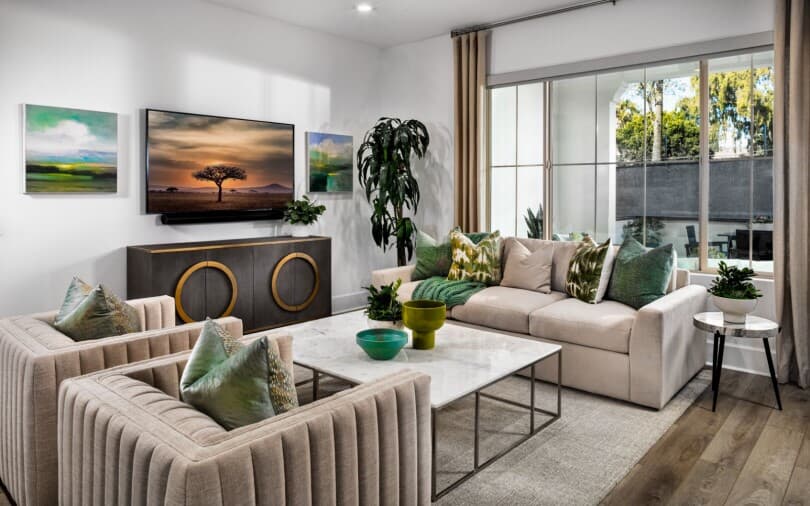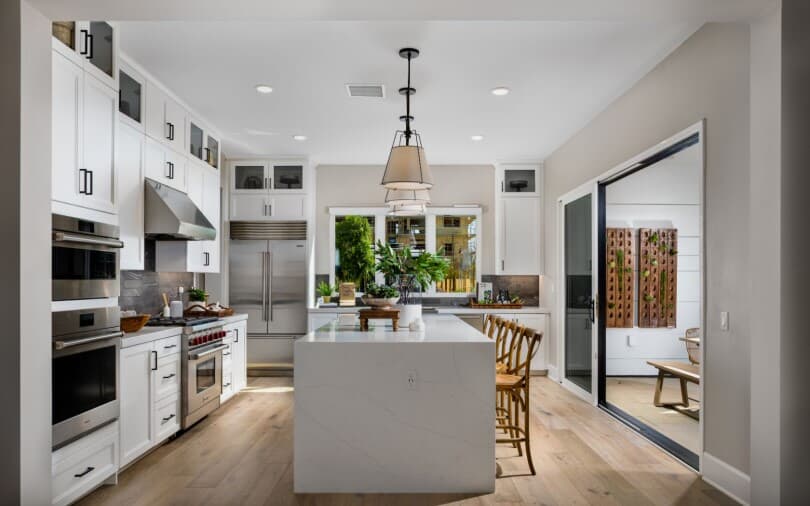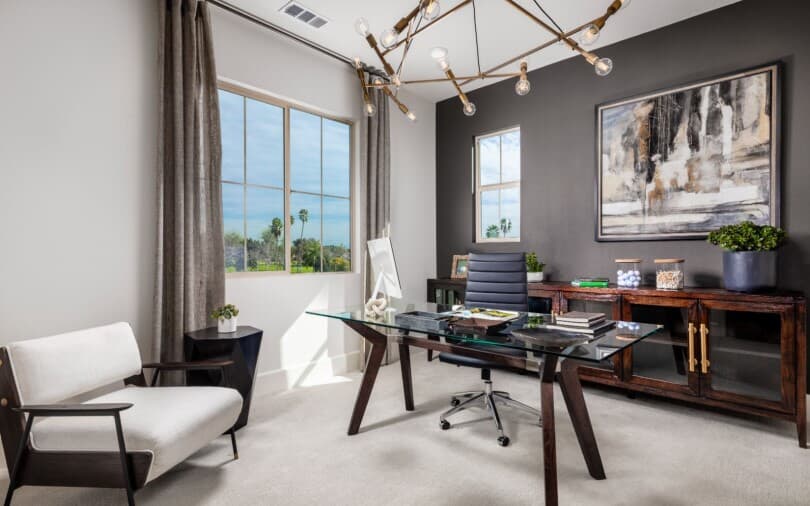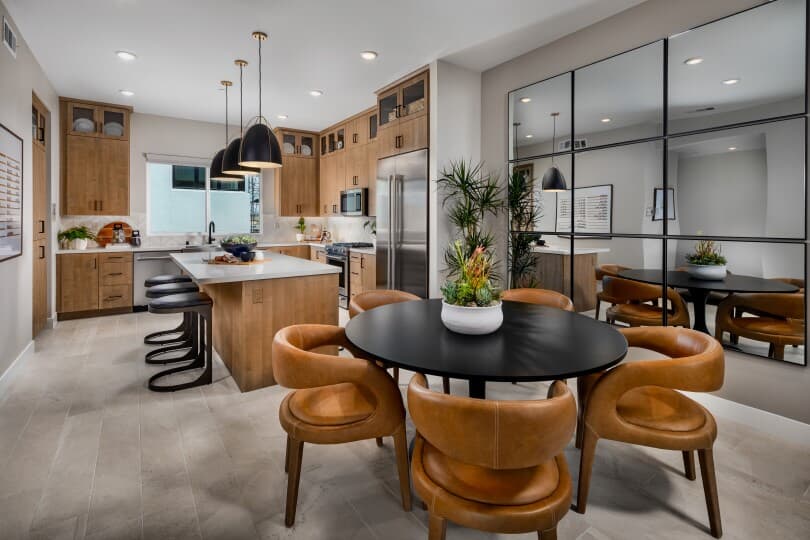Incorporating Feng Shui in Your Home Design

When we can be aware of the details in the spaces around us, we can connect to and create homes that nurture and support us.
While it’s not a design practice itself, there are feng shui principles you can incorporate into your home to create a balanced, peaceful environment.
5 Elements in Feng Shui

Feng shui is based on the idea of optimizing “chi,” or positive energy, by balancing the five elements: earth, water, fire, wood, and metal. Each one symbolizes certain qualities such as stability, wisdom, growth, and creativity so, to live your most fulfilling life, your home must balance all five elements in its décor.
Wood
This element symbolizes creativity, vitality, and growth. When decorating with it, opt for rectangular or columnar shapes that imitate trees, tree trunks, leaves, and flowers. The colors associated with wood are green, blue, or teal.
Fire
The qualities of fire are passion, enthusiasm, and inspiration. Design elements should be triangular or pointy; candles can be incorporated; and décor pieces should be red.
Earth
Earth controls stability, strength, and balance. To bring this rejuvenating element inside, decorate your home in earthy tones and incorporate images of nature.
Water
Water symbolizes depth, spirituality, and wisdom. It’s also linked to emotion and intuition. It can be incorporated into your home through curves and wavy lines as well as black and dark blue.
Metal
This is the element of logic, efficiency, and precision. It unites all the elements, while offering focus and order. Metal items in spherical and round shapes, as well as using white and silver colors, will enhance the material’s productive presence in your home.
Main Principles of Feng Shui in Home Design

It’s not design or decorating, but feng shui principles can inspire the way you decorate your home.
Balance and harmony
The key principle of feng shui is to create a harmonious balance between different elements in a space. The idea is to create a flow of energy, or chi, that is smooth and unobstructed. By designing your home using the feng shui principles of yin and yang, the five elements, and the flow of chi, you can create a harmonious, supportive, nurturing space.
Natural light (yin and yang)
Natural light is essential for feng shui. It is believed to represent positive energy and can help to create a feeling of openness and connection to the outdoors. One way to approach design using feng shui principles is considering the natural light within your home. It’s important to honor our circadian rhythm by allowing natural light to filter in and encourage our bodies to wake up and rest at appropriate times.
Bright light is yang energy, which is stimulating and gets us moving. Low, dim light and darkness are yin energy, which is quiet and restful. You need a balance of both – not too much of one or the other.
Clutter-free space
Clutter can block the flow of energy in a space. To promote a sense of calm and order, feng shui recommends keeping your home tidy and clutter-free. If a space is packed very tightly, there is not enough room for chi to flow freely. This leads to stagnant chi, which can represent blocks or obstacles in your life.
Furniture placement
The placement of furniture can affect the flow of energy in a space. Feng shui recommends arranging furniture in a way that promotes a sense of balance and harmony as well as ensuring the major furniture is in the “commanding position.”
One of the most important principles in feng shui is called the commanding position, which puts us in control of our life so that we can relax and see opportunities coming towards us. When using your major furniture, especially beds, desks, and stoves, you should ensure you can see the door without being directly in line with it.
Indoor plants
Plants are believed to bring positive energy into a space. They can also help to purify the air and create a sense of calm and relaxation. Plants also attract vibrant chi due to their life force. As long as the plants are kept healthy, you’re attracting good energy.
Some plants are better for feng shui than others. Some plants, like cacti, are considered bad feng shui because they lack the need for water. Not to worry, even if your thumb is more brown than green, there are some other low-maintenance plants you can bring in such as Lucky Bamboo, English Ivy, Philodendron, or a Spider Plant.
Feng Shui Room by Room

Entryway
The entryway represents how energy enters your home and your life. Make sure to keep this area clean and free of clutter, so chi can flow through easily. This applies to the exterior as well – sweep your entry regularly and remember to wash your door. You may want to add a light fixture to keep this area bright and introduce the fire element.
Living Room
In feng shui, we want to create harmony. Living rooms are places to gather with family and friends, so they should feel cozy and welcoming. Make sure you have plenty of seats and encourage conversation by facing chairs and sofas towards each other. Avoid having the backs of chairs facing the door as much as possible. Keep the space decluttered to allow the chi to flow freely and bring in plenty of plants.
Kitchen
The kitchen and stove represent how you nourish yourself. Ideally, the stove should be in the commanding position – when you can see the door while not being directly in line with it – and away from your sink. Having your stove opposite the sink creates a clash between the two elements of fire and water.
Home Office
Your desk represents your career. Start by placing it in the commanding position which will be the furthest spot from the entrance of the room. As tempting as it is to have it face a window and enjoy the view, in most cases, it’s not good feng shui practice. When your desk faces a window, your chi goes straight out the window and away from your work. If the only place you can place your desk is in front of a window, pull the shades down while you’re working so your chi stays with you at the desk.
Bedroom
Your bed and bedroom represent you, so this is a really important area to look at in feng shui. First, make sure your bed is in the commanding position. You want to be able to see the door without being directly in line with it while lying in bed or sitting with your back to the headboard. You’re in the “coffin position” if you are directly in line with the door and your feet pointed out.
Next, check under the bed. It’s not ideal to use this area as storage as anything underneath you affects your energy. If you must store things under your bed due to space constraints, make sure they’re soft, bed-related items like sheets and blankets which will allow the chi to flow.
Last, ensure the headboard is against a solid wall. You’ll also want to have space on either side of the bed as well as at the foot of the bed. This allows energy to flow and gives you space to move forward in life.
Improve Your Home’s Feng Shui

Unless you’re building a custom home where you can design every aspect of the floor plan around feng shui principles, there’s a good chance the layout doesn’t adhere exactly in a way to optimize chi. Not to worry! There are several ways to counteract less-than-perfect feng shui in your home, and create a more balanced and harmonious environment.
Clear clutter
Clutter can block the flow of energy in a space, so removing clutter can help to improve the energy in your home. Go through each room and get rid of anything that you no longer need or use. Decluttering must be thorough – simply hiding your stuff in a closet won’t cut it. All those tucked away items still affect the chi flow.
Use mirrors strategically
Mirrors can be used to redirect and balance energy in a space. If there are areas in your home with bad feng shui, consider placing a mirror in a position where it can reflect positive energy into that space.
Add plants
Plants are believed to bring good chi into a space. Consider adding plants to areas of your home that need a boost of positive energy.
Use color
Colors can affect the energy of a space, so consider using color to counteract bad feng shui. For example, if a room has too much negative energy, consider adding a pop of red, which is believed to promote positive energy and good luck.
Use sound
Sound can also be used to counteract bad feng shui. Consider using wind chimes or other sound-producing items to help move energy and create a sense of balance.
Incorporate natural light
Natural light is important in feng shui, so make sure to let in as much natural light as possible. Open curtains or blinds and consider using sheer or lightweight fabrics to allow light to filter in.

From a home perspective, the proper use of design elements and principles results in harmony. By incorporating feng shui guidelines into your home, you can create a space that feels peaceful and connected to the natural world.
Be sure to follow the Brookfield Residential blog for more design advice, homebuying insights, mortgage tips, and more. Explore where we build and connect with our sales team when you’re ready to learn more. We’ll be expecting you!
